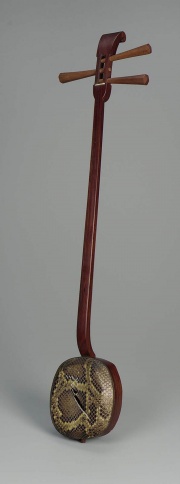Difference between revisions of "Snakeskin"
Jump to navigation
Jump to search
m (Text replace - "\[http:\/\/cameo\.mfa\.org\/materials\/fullrecord\.asp\?name=([^\s]+)\s(.*)\]" to "$2") |
|||
| (One intermediate revision by the same user not shown) | |||
| Line 1: | Line 1: | ||
| − | [[File:17.2051-SC24656.jpg|thumb|]] | + | [[File:17.2051-SC24656.jpg|thumb|Chinese lute<br>MFA# 17.2051]] |
== Description == | == Description == | ||
| Line 16: | Line 16: | ||
| − | == | + | == Resources and Citations == |
* G.S.Brady, ''Materials Handbook'', McGraw-Hill Book Co., New York, 1971 Comment: p. 731 | * G.S.Brady, ''Materials Handbook'', McGraw-Hill Book Co., New York, 1971 Comment: p. 731 | ||
Latest revision as of 10:28, 17 August 2020
Description
A thin, strong Leather made from the skin of snakes, such as boas, cobras, pythons, water snakes, anacondas, and rattle snakes. The scales are removed prior to tanning. Snakeskins are usually dyed and glazed. They are used for shoe uppers, purses, and decoration.
Synonyms and Related Terms
piel de serpiente (Esp.); peau de serpent(Fr.); pele de cobra (Port.)
Additional Images
Resources and Citations
- G.S.Brady, Materials Handbook, McGraw-Hill Book Co., New York, 1971 Comment: p. 731
- Matt Roberts, Don Etherington, Bookbinding and the Conservation of Books: a Dictionary of Descriptive Terminology, U.S. Government Printing Office, Washington DC, 1982
- Edward Reich, Carlton J. Siegler, Consumer Goods: How to Know and Use Them, American Book Company, New York City, 1937


